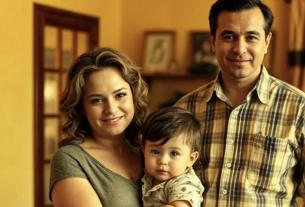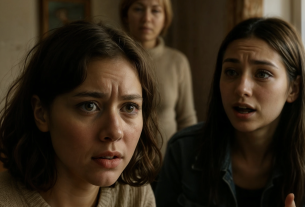Get out of here!” Marina’s voice trembled like a thin string about to snap.
She stood in the doorway, barefoot, hair disheveled, clutching a bundle of children’s toys. At her feet—suitcases jutting out at odd angles, as if thrown together in a hurry. And opposite her—a whole delegation: her mother-in-law with a frozen smile, her husband’s brother Alexey, his wife Yulia, and between them—a small boy tugging at his mother’s skirt.
“Marina, don’t shout,” said Igor, her husband, squeezing in from the side, tiredly. “It’s family.”
“Family?” Marina looked at him with such astonishment it was as if she were seeing this man for the first time. “Then maybe I should pack a suitcase and leave, and you can turn this place into a family dormitory with them?”
Galina Petrovna, the mother-in-law, threw up her hands theatrically, like an actress from an old theater.
“What an ungrateful woman you are! Is it really so hard for you to spare an empty room for my son? For my grandson? Your heart is made of stone, Marina!”
“Stone?” Marina let out a low, rasping laugh. “Well, I did have enough heart to buy this apartment—ten years of back-breaking work like a draft horse. That I managed. As for you—you only managed to barge in here without asking.”
Hearing her sharp tone, the boy began to cry. Yulia picked him up, looking at Marina as if she had pushed the child onto the stone floor. Alexey stared silently out the window, as though the whole scene had nothing to do with him.
“Enough!” said Marina, setting the box down with a thud. “There are your things. As of today, you don’t live here.”
And in that short, deafening pause she suddenly heard herself. Her voice sounded as if it had all been rehearsed: clear, firm, like a verdict.
And yet once she had dreamed of something else. Something entirely different.
Marina had entered this apartment for the first time as if entering a sanctuary: white, clean walls, windows so large it seemed you could scoop the sky up with your hands. She walked from room to room, imagining where the reading chair would go, where the bedroom would be, where the long-awaited dining table would stand. She saw it all in advance like a future film: evening light, books on the shelves, the smell of coffee, and her own laughter bouncing off the walls.
She had saved for this apartment for years. Worked without weekends, denied herself little things, lived as if suspended in air, but inside she kept a small, burning flame: my home will be exactly as I want it.
And when she met Igor, it seemed to her that the picture had finally come together into a whole mosaic. He entered her life gently, like a warm breeze that makes you close your eyes in pleasure. He laughed at her ideas for furniture placement, praised her taste, joked that the apartment was “too spacious for one heart.”
She believed him. Foolishly and so much like a woman, the way one believes a pebble found on the shore might suddenly prove to be a gem.
But now—everything was different.
From the moment her husband’s relatives crossed the threshold of her apartment with their suitcases, each day had felt like a small war. Galina Petrovna behaved like a commander-in-chief: rearranging furniture, handing out orders, criticizing, grumbling. Yulia took over the kitchen in the evenings as if it belonged to her alone. Alexey disappeared into his work without a word, while his son scattered toys that cut into Marina’s feet when she stepped on them.
Igor looked at it all as something inevitable, as if the apartment hadn’t been built on her blood and sweat but had fallen from the sky, and sharing it was only natural.
Marina felt like a prisoner in her own home. Every morning, walking into the kitchen, she saw other people’s mugs, other people’s socks in the bathroom, other people’s voices behind the wall. Even her favorite chair by the window, where she had dreamed of reading in the evenings, was now occupied—her mother-in-law had set up there with her knitting.
And at night, lying beside her husband who turned to face the wall, she thought: Where in this house is there any of me left?
This morning’s clash became the culmination.
“You kicked my family out!” Igor said, looking at her with hatred.
“I didn’t kick out your family. I kicked out invaders,” Marina replied.
She herself was surprised by her words: where had so much hardness come from? Only yesterday she’d trembled at the thought of a scene, and today she spoke harshly and coldly, like bone striking bone.
Galina Petrovna was shouting something behind the door; Alexey silently hoisted a suitcase; Yulia held the crying boy in her arms. Only Igor didn’t move.
He stood in the entryway, stubborn and pitiful, like a schoolboy seeing for the first time that the world is not obliged to revolve around his family.
“So you choose the apartment over me,” he said.
“I choose myself,” Marina answered, and slammed the door.
“Marina, open the door, we need to talk!”—her mother-in-law’s shrill voice twanged at her nerves like a taut string.
Marina sat on the kitchen floor, holding a cup of tea that had long grown cold. She didn’t move, barely breathed. As if, by keeping still, they would all vanish—his mother, his brother, the brother’s wife, their child. Even her husband. Especially her husband.
But the ringing and pounding went on. And then came silence. Dangerous, thick, viscous.
A week earlier, Igor had gone to his mother’s. He left quietly, without a scene. Just packed shirts and trousers, leaving her alone in their bed. Marina thought he would at least return for his tools stored in the closet, but he didn’t come. Apparently, his implements were more needed there, in their “family headquarters.”
At first Marina caught herself waiting for a call, a message, even a short note on a slip of paper. But the phone stayed silent. On WhatsApp only the shameless green “online” dot glowed, like a mockery.
Left alone, Marina felt something strange: the apartment seemed to come alive. As she walked through the rooms she sensed—the walls had exhaled. The air was lighter. Even her chair by the window began to regain the meaning it had been meant to have: a cozy place for thinking.
She sat in the chair, took a notebook, and for the first time in many years began to write down her thoughts. Not for work, not for shopping lists. For herself.
“I was wrong. I wanted to believe that marriage is about partnership, about protection, about a shoulder beside you. But it turned out to be about who shouts louder in your home. I kept quiet for too long. Now I’m speaking. Even if it’s alone.”
The next day Yulia called.
“Marina, I understand you’re angry,” her voice was quiet but insinuating. “But we have a child. You don’t want him to end up on the street, do you?”
Marina was silent.
“We can come to an agreement. Let us stay for at least a couple of months. Alexey will find a new job, we’ll rent a place. We’re not strangers, Marina.”
“You are strangers to me,” Marina said at last. “Complete strangers.”
And she hung up.
But at night doubts still tormented her. She wandered through the empty rooms, listened to the creak of the floorboards, and treacherous thoughts crept in: what if I really went too far? what if I could have endured a little longer?
She found herself searching for excuses for her husband. He was confused, squeezed between his mother and his wife, used to obeying. He wasn’t cruel, just weak.
Then she remembered his words: “From now on, everything is shared.” And the wave of anger rose in her chest again.
One evening, coming home, Marina saw familiar figures by the entrance. Galina Petrovna and Alexey were standing by a bench, the stroller with Misha beside them.
“Are you happy that the child will have to sleep who-knows-where?” the mother-in-law flung at her the moment she appeared.
“I’m happy that I have my home back,” Marina said and walked past.
But she didn’t sleep that night. The boy’s eyes floated before her—frightened, confused. She told herself again and again: I am not obligated to save other people’s children. They have parents. Let the parents save them. But still her heart ached.
A week later Igor showed up. He knocked—politely, without a scene. Marina opened.
He looked exhausted, his face sallow, eyes red. In his hands was a bouquet—pathetic, wilted, like his attempt to make amends.
“I came to talk,” he said.
“Talk,” Marina stood in the doorway, not letting him in.
“Mom—she’s a lot, yes. She pushes, I know. My brother… well, what about him, he’s having a hard time. But I’m your husband. You have to understand. We’re family.”
Marina looked at him for a long time. And suddenly she understood: the man before her was a stranger. The one she had loved was somewhere in the past. This one—a shadow tied to his mother’s apron strings.
“No, Igor,” she said quietly. “Family is when you have each other’s backs. You didn’t stand up for me. You stood up for them.”
“But I…” He lifted a hand as if to touch her, then dropped it. “I don’t want to lose you.”
“And I don’t want to lose myself,” Marina replied, and closed the door.
A month later they officially filed for divorce.
Galina Petrovna called and screamed:
“You destroyed a family! You’re selfish! You’ll be alone for the rest of your life!”
Marina listened in silence. She wasn’t afraid anymore.
In the spring she rearranged the furniture. Not because someone ordered it, but because she wanted to. Flowers appeared on the windowsill, paintings—ones she’d never dared to hang—went up on the walls. She bought a new kettle and a huge rug for the living room.
And every evening she sat in her chair by the window.
Now her home was filled only with her voice, her scent, her thoughts. And for the first time in many years she felt: this is right.
A home belongs to the one who knows how to protect it. And protecting yourself is the hardest of all. But once you dare—there’s no way back.
And Marina smiled—truly freely, for the first time



